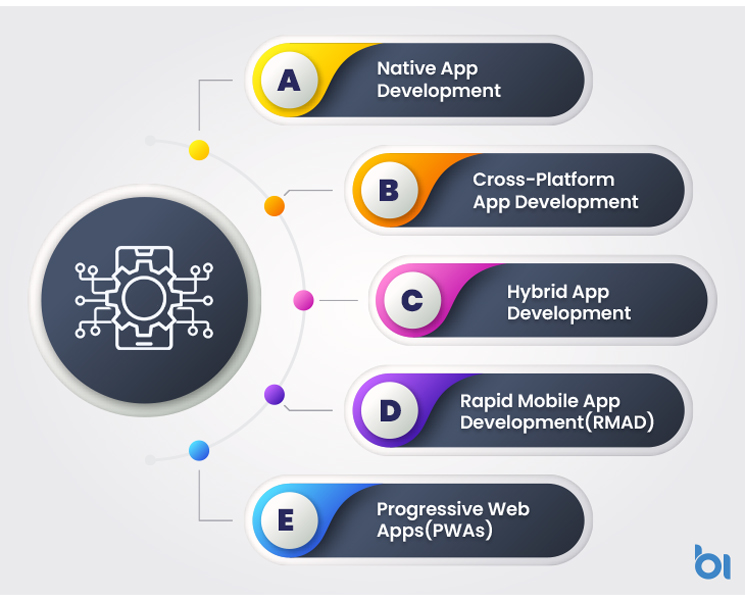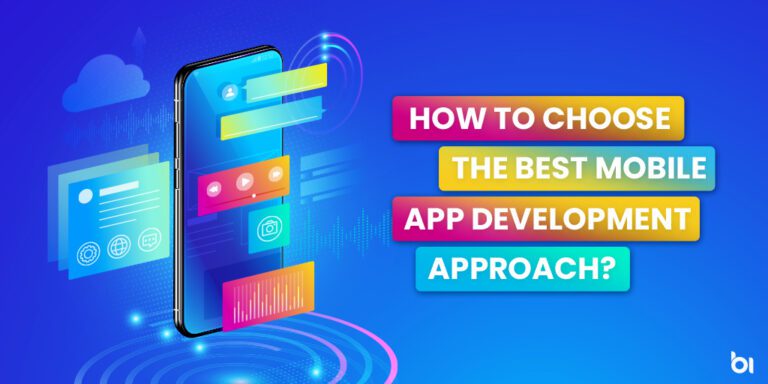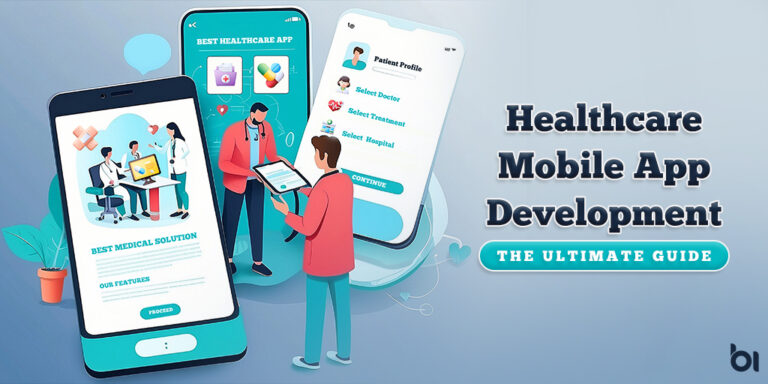Mobile app development is undoubtedly at its peak now, but a major drastic fact is that more than 80% of apps do not survive more than a year. A Clear reason for this setback is the wrong selection of app development approach. if you wish to survive and thrive in your niche choosing the right development strategy and toolset might be a decision worth millions.
This post will help you explore 5 key mobile app development approaches and under what circumstances which app development approach you should consider getting the profitable and best-performing application.
Let’s get started with….
5 Key Mobile App Development Approaches
When it comes to app development, there are five broad approaches:

Which mobile app development approach suits your projects depends more on your business requirement. Your mobile app development should correspond to your business, customers’ needs, and market demands.
When choosing mobile app development approach, you need to decide on numerous technical aspects as well.
So, let’s explore all App Development approaches one by one, to get you to understand the purpose, pros, and cons of each of these.
Native App Development
Native app development is the process to develop apps/software that need to be operated on specific devices and platforms such as Android and iOS with the use of completely different technology stacks.
In this approach, developers use platform-specific programming languages, software development kits, and development environments offered by the OS.
Pros of Native App Development
- Overall, the best performance
- Platform-specific UI implementation
- Support OS features by 100%
- Fully access to hardware-related features
- Clear & consistent app update path
- Supported toolset
- Highly reliable, secure, and responsive
Cons of Native App Development
The major disadvantage of native app development is that the code written is platform specific, code written for a mobile platform cannot be tailored for another platform. Also, Enhancements, security, and maintaining native apps are complex as compared with a web app.
When & Why go for Native app development approach?
If you’re building an app that involves heavy processing or requires access to low-level APIs like Bluetooth, you should go with native development.
- If you have the budget to invest more for a superior UI/UX and performance.
- If you want an app that requires access to hardware-related features such as gestures, geolocations, or Touch ID.
- If you’re looking to develop a graphics-heavy app/game ensuring great speed & performance.
Cross-Platform App Development
In a cross-platform app development approach, developers develop apps that can run on different platforms, be it for iOS, Android, or Web apps. Thus it solves the challenge of creating a separate application for each mobile platform. In this approach, developers use cross-platform frameworks and tools based on JavaScript or .NET/C#.
Pros of Cross-Platform Development
- Uniform across all platforms
- budget efficient solution for low funding
- Implementation is fast & easy
- On-time Publishing for all platforms
- Reusable source code
- High demographic coverage
- Fast time to market
Cons of Cross-Platform Development
- Lower performance.
- Harder code design.
- Long wait time for new features.
When & Why go for Cross-platform development approach
If you’re targeting a larger audience of different platforms’ users, it would be better for you to go with cross-platform development. This approach is most suited for midsize businesses looking for low-budget applications with simple UI without much customization.
Hybrid App Development
Hybrid mobile app development is an approach to programming for mobile devices only. In this approach, the application code is developed by using standard web technologies and tools like JavaScript, CSS, and HTML5, and executed within a native shell.
In hybrid app development, using a single code base enables deployment to all platforms, lowering the cost compared to native apps. Hybrid apps have hardware-dependent features and have access to device hardware components and native platform libraries.
Pros of Hybrid App Development Approach
- Single development team
- Faster time to market
- Easy code portability
- Capable of using hardware components
- Excellent user experience as of native apps
- Lower development cost
- Efficient to work on and offline
Cons of Hybrid App Development Approach
- limited user interface
- Difficult to exploit the platforms’ capacities in full
- Bad performance and slow transition between pages
- Dependency on the browser’s speed
- low performance
- Slower interactions
- Generic UI
- limited access to the device’s hardware and OS features
When & Why go for hybrid app development?
When you want to target a wider user base across different platforms, with limited business requirements, budget, and time, hybrid app development would be the best approach.
Rapid Mobile App Development(RMAD)
The Rapid Mobile App Development approach is used to develop cross-platform applications but comparatively in a short time. It involves the usage of specific low-code or code-free development tools to program simple apps for various business applications.
This approach uses little panning, initial prototyping, recyclable software components, and the use of the adaptive process. Developers simply declare the functions and features of applications on the front end and the backend translates the specifications into code. Thus, it removes the need for database coding.
Pros of RMAD
- Lower investment
- Simplified development process
- Serve multiple projects
- Low-code or no-code development
- Reusable code base
When & Why go for RMAD?
Rapid mobile application development (RMAD) uses low-code/no-code programming tools to speed up the process of application creation for mobile platforms, best suited when you’ve got a tight deadline to deliver fast.
Progressive Web Apps(PWAs)
PWAs are actually not mobile apps, but they are websites made to resemble an application, similar in appearance and functions to any native app. They can be installed on the home screen of your smartphone, laptop, tablet, or desktop.
PWA development uses a set of optimal software development practices to make a responsive web application that can connect independently and function without a regular browser.
Pros of Progressive Web Apps
- Low maintenance cost
- Need single codebase
- Responsive UI
- Installed on local browser
- Works on and offline
When & Why go for progressive web apps?
If you are struggling with a high abandoned rate and want to increase the time users spend on your pages, progressive web apps would work best for you.
Users often abandon your page if it loads slowly since the progressive web app is lightweight and loads faster, thus reducing the abandoned rate.
Which App Development Approach Suits You Best?
Tailoring your mobile app development strategy is more depends on your audience’s needs, market standards, and business objectives. So, consider the purpose first and the resources, budget & time at hand.
When choosing mobile app development approach, you need to decide on numerous technical aspects, if you are not strong on the technical ground it might be a little overwhelming for you. In that case, you can ask for professional guidance from any trustable mobile app development company like Binary Informatics. Our expert business consultants are always there to guide you on your mobile app development journey.
Here are few more related reads-
Mobile App Development Process? In 6 Simple Steps
How to Reduce App Development Cost: Best Practices, Tools & Pro Tips




